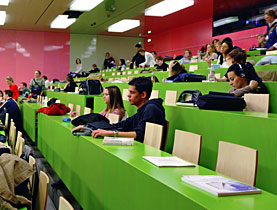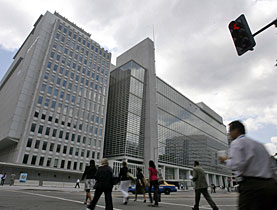Swiss come high up in globalisation rankings

Switzerland has come fourth in a worldwide globalisation ranking for 2008 – up two places on last year.
Economic Institute KOF’s Index of Globalisation, published on Tuesday, compared 122 countries, with small, western European nations generally topping the list.
According to the Zurich-based KOF, globalisation in Switzerland has increased continuously since the 1970s and particularly since the 1990s. Since 1991 Switzerland has been among the world’s ten most globalised countries.
Despite falling in the rankings in recent years, the country rose this year to fourth place, as a result of a substantial rise in foreign direct investment, said KOF.
The institute used three main aspects to assess globalisation. In terms of economics, Switzerland was placed 19th, up from 20th last year.
Politically it was ranked 24th, as in 2007. The country maintained its top spot for social globalisation.
Axel Dreher, the report’s author and KOF senior researcher, told swissinfo that Switzerland was number one in the social category because the country was open-minded and had a broad focus.
Engaging across borders
“What we tried to measure here is the flow of ideas, conversations with people from other countries, the usage of the internet, telephone traffic and the number of foreigners,” he said.
“Tourism in general is also counted as this is part of people from one country engaging with people from another.”
Dreher said Switzerland fell down in the economic ranking because it was still “inward oriented” to some extent in some sectors, such as agricultural products.
“In the political ranking, it’s pretty obvious that a small country cannot be on top, so you have countries like France, the United States, Russia… and China in number ten, that are more politically interacting with other countries,” he added.
Switzerland is in good company in the top five, with similar countries – small, western European – dominating. Austria, Belgium and Sweden took the first three rankings. Denmark was fifth.
Dreher said this was because such countries generally did well in both economic and social globalisation, which have a larger weighting than the political category in the overall globalisation calculations.
Lower-ranked countries
Elsewhere, neighbouring Germany was ranked 11th overall in terms of globalisation, while France was placed ninth. Britain did well in seventh place, but the United States was only ranked 22nd.
At the bottom of the list were Burundi, Myanmar and Rwanda. KOF said the ten lowest ranked countries scored badly in all three globalisation categories.
The degree of globalisation in the ten least globalised nations was about a third of that in the ten most globalised ones, it added.
Dreher said that, in general, globalisation had increased worldwide, but at a slower pace than in the boom years of the 1990s.
“What you can see is that in western, rich countries the increase in globalisation has more or less come to a halt… but countries on a lower level of the index, developing and transition countries, continue with their catching up process,” he told swissinfo.
“So overall there is an increase but it’s a slower one than we could observe in the last 20 years or so.”
swissinfo, Isobel Leybold-Johnson
The KOF Index of Globalization is available for 122 countries over the period 1970-2005 and is calculated on the basis of 24 variables.
Economic dimension: measures long distance flow of goods, capital and services as well as information and perceptions that accompany market exchanges. Actual flows of trade and foreign investment are measured as well as the degree to which trade and capital flows are restricted.
Social dimension: the spread of ideas, information, images and people.
Political dimension: the diffusion of government policies.
Switzerland often does well in international rankings. In October 2007 the Geneva-based World Economic Forum (WEF) ranked Switzerland the world’s second most competitive economy after the United States. Denmark, Sweden and Germany also did well.
But in the World Bank Doing Business 2008 report Switzerland dropped one place to 16th. The survey compared the time and cost of setting up, running and closing a small and medium-sized enterprise (SME) in 178 countries.

In compliance with the JTI standards
More: SWI swissinfo.ch certified by the Journalism Trust Initiative



You can find an overview of ongoing debates with our journalists here. Please join us!
If you want to start a conversation about a topic raised in this article or want to report factual errors, email us at english@swissinfo.ch.